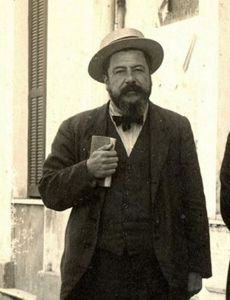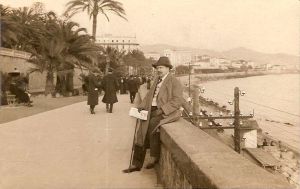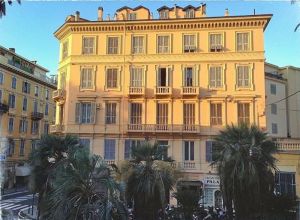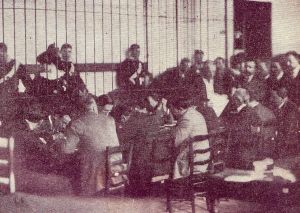A lawyer from Sanremo between his legal commitment and political battles in liberal Italy
 Orazio Raimondo was born in Sanremo on 5 June 1875 to the well-known lawyer Stefano, originally from Rocchetta Nervina, and Luigia Corradi, niece of the President of the Chamber of Deputies Giuseppe Biancheri, a leading figure on the post-unification political scene.
Orazio Raimondo was born in Sanremo on 5 June 1875 to the well-known lawyer Stefano, originally from Rocchetta Nervina, and Luigia Corradi, niece of the President of the Chamber of Deputies Giuseppe Biancheri, a leading figure on the post-unification political scene.
The paternal and maternal families were dramatically affected by the suicide of Giuseppe Corradi, banker and member of the Chamber of Commerce of Porto Maurizio, involved in the collapse of the Banca depositi e sconti in 1887, and then, in 1896, by the withdrawal from public life of Secondo Biancheri, due to a contribution paid to him by the Mauritian Order, of which his brother Giuseppe was a high official.
After finishing primary school at the age of six, Orazio Raimondo graduated from the Liceo Classico "Gian Domenico Cassini" at the age of fourteen, and at eighteen, in 1893, he graduated in law at the University of Genoa.
In the same year, the Sanremo socialists officially formed the city section of the Socialist Party of Italian Workers (PSLI), which would join the wave of protests against Francesco Crispi's repression of the Sicilian fasces. While still attending the University of Genoa, Raimondo enthusiastically joined the nascent socialist movement, convinced in particular by Filippo Turati's fervent preaching.
Returning to Sanremo to take up the legal profession, he joined the editorial staff of the newspaper "Il Pensiero di Sanremo", in which various Sanremo socialist exponents such as Augusto Mombello, Giovanni Battista Rubino and Francesco Rossi collaborated, and from which he would leave at the end of 1893, together with a group of other "dissidents", including Mombello, Rubino and Rossi, to found the new newspaper "La parola dei socialisti sanremesi", which would begin publication in May 1896.
In the meantime, on 10 November 1893, Raimondo was arrested by the police and tried together with twelve other 'subversives', including Mombello and the anarchists Luigi Galleani and Eugenio Pellaco, on the charge of having joined the Socialist League, affiliated to the Italian Workers' Party. Thanks also to his young age, he was only sentenced to a few months of forced residence in Tortona, where he founded the newspaper "Il lavoratore tortonese".
In 1894 he took part as a delegate in the Ligurian Socialist Congress in Sampierdarena and in December 1895 he was again denounced to the special provincial commission of Porto Maurizio for seditious propaganda, but, again thanks to his young age, he avoided the sentence of forced residence proposed by the public prosecutor.
In November 1896, he took over from Mombello as editor of the newspaper "La parola dei socialisti sanremesi". After trying in vain to win Giuseppe Biancheri's constituency in the political elections of March 1897 through the candidacy of his colleague and friend, the lawyer Giacomo Cassini, the following year he stood in the Sanremo municipal elections, being elected minority councillor and then councillor in the council led by Mombello, the winner of the May 1902 elections.
After trying in vain to win Giuseppe Biancheri's constituency in the political elections of March 1897 through the candidacy of his colleague and friend, the lawyer Giacomo Cassini, the following year he stood in the Sanremo municipal elections, being elected minority councillor and then councillor in the council led by Mombello, the winner of the May 1902 elections.
On 8 December 1900 he had meanwhile been initiated into Freemasonry at the "Giuseppe Mazzini" lodge in Sanremo, founded by Giovanni Bernardo Calvino (Italo's grandfather) and the Waldensian pastor Ugo Janni, which was joined by radicals, socialists and liberal democrats.
On 3 February 1905 he became venerable master, while, after the victory of the socialists in the administrative elections of July 1906, in the same month he succeeded Mombello as the new mayor of Sanremo.
The new administration continued all the works that had been put in the pipeline by the previous Mombello administration, but this did not prevent him from practising his legal profession.
In 1908 he was to defend the socialist lawyer Francesco Rossi, former mayor of Bordighera, accused of embezzlement.
In June 1908, the mayor Orazio Raimondo resigned, paving the way for new local elections which, in 1908, were won by Alfredo Natta Soleri's Constitutional Party; the electoral defeat was partly due to accusations that the previous administration had squandered the public treasury.
Firmly rooted in his socialist ideas, he was elected as a deputy of the Kingdom of Italy in the 1913 Italian political elections.
In 1913 he defended the socialist councillor of Savona, Giuseppe Garibaldi, in a libel case brought against the newspaper "Battaglie sindacali", which had accused him of running a number of brothels.
In 1914, after the Ancona congress, he left the Italian Socialist Party.
The episode that gave him considerable fame, given the great resonance he had at the time, as a criminal lawyer, remembered for his oratory, was, in 1914, the defence of the noblewoman Maria Elena Tiepolo Oggioni before the Court of Assizes of Oneglia, which, in the end, thanks also to his passionate defence, acquitted her of the charge of murder, in self-defence.
The event, which we report in detail below, had great resonance at the time.
On 12 January 1918, he was called to serve on the commission of enquiry set up to investigate the causes of the defeat at Caporetto.
He worked for the creation of the first institution that would deal exclusively with industrial floriculture, to which he donated a substantial bequest, which never saw the light of day on 25 January 1925 with a Royal Decree.  Sanremo's fame as a city of flowers is also due to this decree.
Sanremo's fame as a city of flowers is also due to this decree.
By now ill and in decline, on 11 December 1919 he went to Palermo again to defend the lawyer Salvatore Andò in a trial against Antonio Alfano, but without any particular enthusiasm.
Returning to Sanremo to assist his mother, he died suddenly in his house in Corso Umberto I (now Corso Mombello) on the morning of 11 January 1920, following the flare-up of a serious nephritis.
After his death, his brother Riccardo tried to take over his political legacy, but, having stood in the 1921 elections on the lists of the National Blocs, he was not elected, and even ended up being arrested and convicted, in 1925, of embezzling funds from the former Socialist Seamen's Union.
The affair of Countess Maria Tiepolo
Sanremo, exactly on 8 November 1913, was the scene of a dramatic murder: Countess Maria Tiepolo, wife of Captain Carlo Ferruccio Oggioni, killed her husband's attendant, Bersagliere Quintilio Polimanti.
For a few days, Italy was distracted from other thoughts to concentrate on the countess, whom the newspapers immediately described as «beautiful», while they described Polimanti as «a handsome young man, tall, with blond and curly hair».
The event took place on the first floor of a building in Corso Umberto 2.
The countess led a more than decent life in Sanremo, her husband commanded a regiment and had his own attendant, and she enjoyed a comfortable existence with a personal maid. Perhaps bored, she jokingly began a romantic and non-existent love affair with her husband's orderly, encouraging excessive intimacy and dreaming of a relationship that she perhaps did not really want.  Not so the young soldier who, dazzled by such wonder, became overly involved, wrote fiery letters, bragged to his fellow soldiers and apparently ended up making bold and inappropriate advances towards his mistress, who in fact gave him too much freedom.
Not so the young soldier who, dazzled by such wonder, became overly involved, wrote fiery letters, bragged to his fellow soldiers and apparently ended up making bold and inappropriate advances towards his mistress, who in fact gave him too much freedom.
To defend herself against these clumsy attempts at seduction, the countess one day took a gun and fired blindly, unfortunately killing him on impact.
The frivolous conduct of the defendant did not help her at the trial, where several inconsistencies put her in a bad light, in favour of the memory of the young and inexperienced soldier, victim of something much greater than himself.
The Countess was defended, with a memorable harangue, by Orazio Raimondo, who managed to get her acquitted of all charges.
Leonardo Sciascia wrote a book entitled "1912+1" in which he admirably recalled this episode, which at the time caused such a stir in the national and European press....
(sources: text taken from notes by Andrea Gandolfo; others from newspapers of the time; images from personal archives and the web)




